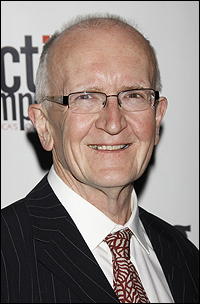
*
"I've always been fascinated by crises of faith," playwright John Pielmeier says. "And I've always been fascinated by crises with children. This is the perfect combination."
Pielmeier is talking about his stage adaptation of "The Exorcist," the bestselling 1971 novel by William Peter Blatty. It's onstage this summer, July 3-Aug. 12, at the Geffen Playhouse in Los Angeles, with Tony-winning director John Doyle at the helm.
Blatty's novel, about a young girl possessed by a demon and the two priests who come to remove it from her body, is considered one of the most frightening horror stories ever written. It was on the New York Times hardcover fiction list for 57 straight weeks, was No. 1 for 17 of those weeks, and was turned into a hugely successful 1973 movie. The cast at the Geffen Playhouse includes Brooke Shields (Broadway's Wonderful Town, The Addams Family, Cabaret) as the girl's mother and Richard Chamberlain (Broadway's My Fair Lady, The Sound of Music, TV's "Shogun" and "The Thorn Birds") as the older priest.
Pielmeier, 63, the author of Agnes of God, the hit 1982 Broadway play that also involved a crisis of faith, says that the adaptation is explicitly of the novel, not the movie. "The movie is the movie," he says. "It's arguably the greatest horror movie ever made. I had absolutely no interest in trying to remake something that had been done so effectively in another medium. I thought the novel covered more areas than the film does, and in greater depth — areas I was interested in exploring, such as crisis of faith. The novel gave me more freedom to do what I wanted to do. Also, the rights to the movie weren't available. That's the simple answer. But it's not the real answer."
Pielmeier, who has recently been writing for television, including for the Golden Globe-nominated 2010 miniseries "The Pillars of the Earth," says that four years ago several producers asked him if he was interested in adapting "The Exorcist" for the stage.
 |
||
| John Doyle |
||
| photo by Joseph Marzullo/WENN |
Pielmeier says he told Blatty "that I want the demon to be very much present onstage, not a voice that comes out of the child. To me some of the most important scenes were those between the demon and Father Damien [the Jason Miller role in the movie] and I wanted that demon to have a presence. I also felt that it should be done on as empty a stage as possible."
He told Blatty he did not want to try to re-create the film onstage. "It's as unlike the film as you could possibly get. I wanted to do it with absolutely minimal special effects, effects that if I were to use them would not make an audience say, 'How did they do that?' — a question that I think takes audiences out of the play."
How does he deal with audience expectations — with those who have seen the movie and expect the child's head to spin? "The first question anybody asks me is, 'How are you going to make the head spin around?' The answer is we aren't. As soon as the audience walks into the theatre and sees what is essentially an empty stage with a table and a few chairs on it they're going to know this ain't the movie. Certainly for those involved in the theatre, the fact that John Doyle" — known for his minimalist productions, like his Broadway musical revivals of Stephen Sondheim's Sweeney Todd and Company — "is directing should give them some hints about what they're going to experience.
"The second question I'm asked is, 'Is this a musical?' No, this is not a musical."
(This feature appears in the July 2012 subscription issues of Playbill magazine.)









